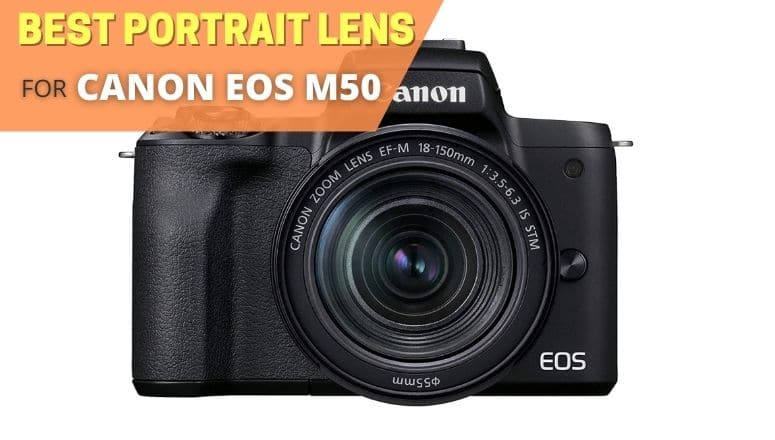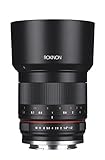- Dual Pixel CMOS AF for fast, accurate autofocus that helps you get the photo you want right as the moment happens
- 241 Megapixel APS C CMOS sensor and the DIGIC 8 Image Processor delivers incredible color, clear details, and stunning range
- Vari angle touchscreen LCD has a flexible tilt range ideal for high angle and low angle shooting, and reviewing your photos
What is the best portrait lens for Canon EOS M50?
So you’re wondering which lens is best for portrait photography with your Canon EOS M50? Portrait photography is something we do on a regular basis, whether with friends, family or strangers. Many beginning photographers bought their first camera with the kit zoom lens and a portrait lens is often one of the first tools needed as an extra.
If you want to get good results, it will be necessary to use the right equipment. However, there are many models and choosing a portrait lens can be complicated because it depends on several factors.
To help you, in this article we’ll explain all the features you’ll need to consider when determining which portrait lens to choose for your Canon EOS M50.
How to choose the best portrait lens for my Canon EOS M50?
Here are some things to consider when choosing your portrait lens to go with your Canon EOS M50:
Fixed or zoom lens? Which focal length to choose? The focal length is an important criterion to determine which portrait lens to choose: a fixed focal length cannot zoom, and you will have to move to change the size of your subject on the image.
You must choose according to the type of environment where you intend to take portrait photos: outside (during a trip for example), in a concert hall, in a studio, during a wedding… A zoom lens is more versatile, allowing you to go from a wide angle to a standard or telephoto lens very quickly. Their negative points are that they are generally heavier and more expensive than a fixed focal length.
Although fixed focal lengths don’t offer as much versatility as a zoom lens, they still have many advantages: generally the image quality they provide is far superior to a zoom lenses, for a much lower price. A fixed focal length portrait lens also allows the use of very large apertures such as f/1.4 or f/1.8 which is impossible to obtain with a zoom lens.
The larger this aperture (i.e. the smaller the f/number), the more light the lens will let in on the sensor. It will allow to reduce the depth of field in order to isolate the photographed subject and to realize superb effects of bokeh (background blur).
A large aperture also helps reduce motion blur in dark environments. The choice between a fixed focal length and a zoom lens is above all a matter of compromise between image quality and versatility.
As with any photographic equipment purchase, choosing a portrait lens also depends on your budget. If you are just starting out in photography and want to learn about portraiture without breaking the bank, you may want to consider third-party lenses such as those from Tamron, Sigma and Samyang rather than the official Canon, Nikon or Sony lenses.
They are much affordable and generally offer very similar image quality. On the other hand, the build quality is generally better on the official lenses. If you are a very demanding photographer and are looking for exceptional image quality, I would still recommend investing in a lens from the same brand as your camera.
If you are not sure on what portrait lens to choose for your Canon EOS M50, this small selection is suitable for most portrait photographers.
Note: the product links in this article lead to Amazon.com
Summary
- Canon EF-M 32mm f/1.4 STM (Perfect portrait lens)
- Samyang 50mm f/1.2 AS UMC CS (Manual, bright lens)
- Canon EF-M 55-200mm f/4.5-6.3 IS STM (Zoom lens)
- Useful accessories
- Conclusion
Here’s the Top 3 portrait lenses you should consider for your Canon EOS M50:
Canon EF-M 32mm f/1.4 STM
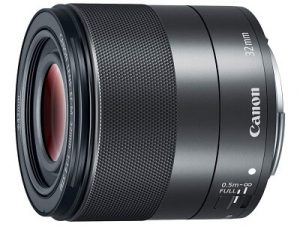
Filter diameter: 43 mm
Full Frame Equivalent: 51 mm
Equivalent to a 51mm 35mm, this 32mm lens is one of the brightest lenses available for the Canon M50 and is perfect for portrait photography.
Compact and relatively light, it offers very sharp images. This lens lacks stabilization, but it has a smooth and progressive STM autofocus motorization, which is particularly suitable for shooting video.
On its barrel is a setting to limit the focus range to get the focus faster.
- Fixed focal length Lens with high image quality
- Bright f/1.4 maximum aperture
- 32mm field of view equivalent to 51mm on 35mm full-frame
Samyang 50mm f/1.2 AS UMC CS
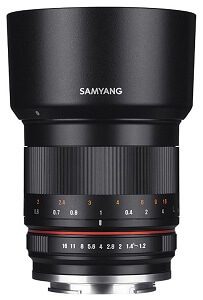
Filter diameter: 62 mm
Full Frame Equivalent: 75 mm
At present, this is one of the best alternative available to make portrait photography with your Canon M50 without having to use a Canon EF Lens Adapter. Well, it’s a manual focus lens, but it’s not complicated once you get the hang of it. If you agree to ignore an autofocus, this Samyang 50mm f / 1.2 offers a remarkable image quality, with a crazy bokeh and incredible sharpness. Its large f / 1.2 aperture also allows it to be used in low light.
This lens is not for everyone, but if you take the time to get used to the manual focus, it will allow you to make phenomenal images.
- Lens features Rokinon Ultra Multi-Coated (UMC) optical glass for sharp, clear images
- 50mm fixed focal length with aperture range of f1.2-f22
- Constructed of 9 lens elements in 7 lens groups
Canon EF-M 55-200mm f/4.5-6.3 IS STM
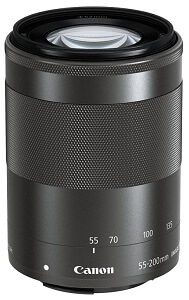
Filter diameter: 52 mm
Full Frame Equivalent: 88-320 mm
A very good complement for a standard lens like the 15-45mm, this Canon EF-M 55-200mm f / 4.5-6.3 IS STM is a telephoto lens that can zoom in on distant subjects. This is also the most powerful zoom currently available for the Canon M50.
It has built-in stabilization to compensate for camera shake, which is essential when used at 200mm and f/6.3. It’s not a very bright lens but if you want to take portrait photos of distant subjects, it does a very good job.
STM autofocus technology is fast and accurate in both photo and video on static subjects, but a little less with fast movements, unfortunately.
For a telephoto lens, it’s also very compact and lightweight, thanks to its plastic design (it is not tropicalized, be careful with moisture and dust).
- Focal Length & Maximum Aperture: 55–200mm f/4.5–6.3
- Lens Construction: 17 elements in 11 groups
- Diagonal Angle of View: 27°50'–7°50'
_
☛ MORE PORTRAIT LENSES
- For other portrait lenses options, check this out: The best lenses for Canon EOS M50
_
Useful accessories for portrait photography
They are essential to make photos and videos. Whether it’s for transporting your equipment, stabilizing your camera or protecting your camera and lenses, accessories are far from being superfluous. But you have to choose them well if you want them to last.
Here is a small selection of must-have accessories to complement your lenses and your Canon EOS M50 if you want to do portrait photography:
Conclusion
To summarize, the important things to consider when looking for the best portrait lens for Canon M50 are focal range, aperture and price. If you’re not sure which portrait lens to choose, you can also go to Flickr and search for examples of photos taken with the lens you are interested in, this will give you a good idea of its possibilities.
Another thing, if you are planning to do portrait photography while on vacation or travel, consider the weight and bulk of the lens. If the whole thing is too heavy or bulky and lacks discretion, you won’t want to bother with it and would rather just take your smartphone with you. You may also not want to risk damaging an extremely expensive lens.
And finally, perhaps the most decisive point about choosing the perfect portrait lens for your Canon EOS M50 will be if you need to get a portfolio of professional quality portrait photos (it may be your business or it may become your business who knows?).
Last tips: Remember to always focus on the eyes. And whatever portrait lens you choose, try to snap as much as you can, as it is often during the selection phase that you’ll discover the perfect picture. Most importantly, be always ready, as the magic in a portrait may only last for a short moment.
